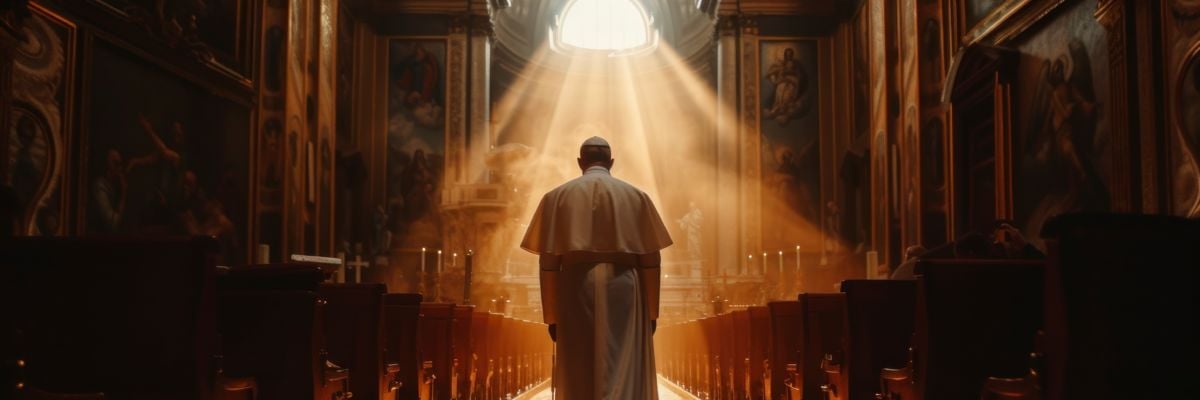
Joe Heschmeyer helps a caller who asks how to defend against those who claim that the church went through a Great Apostasy after the apostles died.
Transcript (Auto-Generated):
My question is about the great apostasy.
As a Catholic, how do I defend the stance that the church did not fall into apostasy once the apostles died?
word apostasy means falling away.
And the Bible talks about apostasy, talk about people who fall away from Christianity, fall away from the church. But there are Protestants and Mormons who believe in a great apostasy, where the problem isn’t that people are falling away from the church, the ideas of the church has itself become apostate. Now I wanted to just point out that these are, even though the same word is used, they’re actually kind of opposite concepts. Because if I fall into apostasy, the problem is I’m not Catholic enough.
If the church is apostate, the problem is that I’m too Catholic.
And so even though apostasy is used in both cases,
the great apostasy isn’t people falling away from the church, it’s the church being false.
And so that’s kind of the thing I would point out. Just to kind of clarify what we’re talking about. So how do we know great apostasy isn’t true? Well, besides the fact that there’s zero biblical evidence for the church falling away, like as a church, rather than people falling away from the church. You also have all of the biblical data about the church. So I’m gonna give you just a few pieces, because there’s a lot here.
In Matthew 16, Jesus says, “I will build my church.” And I started to say, if he hadn’t have said that, if Jesus was just this great teacher, Messiah, prophet, son of God, and he didn’t build the church though,
his followers wouldn’t just say, “Well, we’re gonna go back to our old ways of life.” They would still try to follow him. They would just have to build their own denominations.
And so I like to point this out, like when Protestants approach Christianity, they’re doing it as if Jesus had said, “I will not build my church, you have to do it.” But he says the opposite. He says, “I will build my church.” So the church isn’t something we have to build. The church is something we have to find and join.
That you also have these other passages, Daniel two, for instance, Nebuchadnezzar’s dream. There’s the four tiers, gold, silver, bronze, and then iron and clay mixed together. And they represent the four kingdoms that conquer Israel. It’s Babylon, then it’s the Persian, Medo-Persian empire, then the Greek empire, then the Roman empire. And we’re told during the days of the fourth empire, so during the days of the Roman empire, a stone not formed by human hands will come and crush this, like the feet of clay, and will build a mountain that will never be destroyed. Now that to all appearances looks like someone is coming from heaven to build a kingdom on earth and that kingdom won’t be destroyed. That’s not consistent with the idea someone came from heaven, built a kingdom, and the kingdom was destroyed.
Third, you have just the description of the church. It’s the bride of Christ and it’s the body of Christ. And the entire picture all the way up to and including the book of Revelation with the wedding feast of the lamb is about this everlasting relationship between Christ and the church. And Jesus speaks of it in this way. Luke 22, he talks about the apostles sitting on 12 thrones judging the 12 tribes of Israel. And so the apostolic nature of the church, his body and bride lasts forever. And Ephesians 1, St. Paul talks about the church as the fullness of him who fills all in all. That the church is the continuation of Christ on earth. So to say that the church went into a great apostasy is to say that Christ left us as orphans when he promised he wouldn’t do that.
So all of that is the theological approach. And I would heavily lean in that. The other thing I would do though, number two is looking at the historical approach. And I’ve actually written an entire book about this. If you’d like a copy of my book, the early church was the Catholic church. Because if you’re gonna say the church originally believed X, this thing that I believe is a Protestant, as a Mormon, as whatever. And then over time, this false teaching, Y crept in. We should be able to find that in history. We shouldn’t just have to take your word for it. You should be able to show, here are all of these early Christians who interpreted the Bible the way that I do. But almost invariably, when someone makes these claims about the church going into apostasy, when you ask for the historical evidence, they point to a Bible verse and say, well, I read it this way. It’s like, well, I don’t care how you read it. Show me the centuries of people who read it the way that you do. And then that there was a switch. Because we should see a number of things. If you walked into a Protestant denomination and said, now we’re gonna start believing in the Pope, now we’re gonna start believing in the real presence, now we’re gonna start praying to Mary, there would be an outrage. Because that would be a major change. And so if all of these things that people protest about
were major changes to the structure of Christianity, to the theology of Christianity, we should see major outcry. So show me the outcry. Because we can find outcry on much smaller issues along the way, and just not this one. That is a very strange absence of evidence. But more than that, we can actually find people from remarkably early on,
taking for granted that everybody believes these very Catholic things. So that’s what I would say, that you’ve got the theological approach. It doesn’t make sense if you understand what the church is and who built it to suggest that it was destroyed by the gates of hell.
Second, you’ve got the historical approach. We can talk about the earliest Christians, people like Saint Polycarpus Smyrna, the Enignations of Antioch, Saint Irenaeus of Lyon, and Saint Justin Martyr, all before the year 200, who look and sound astonishingly Catholic.



